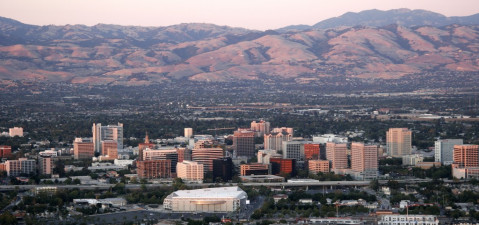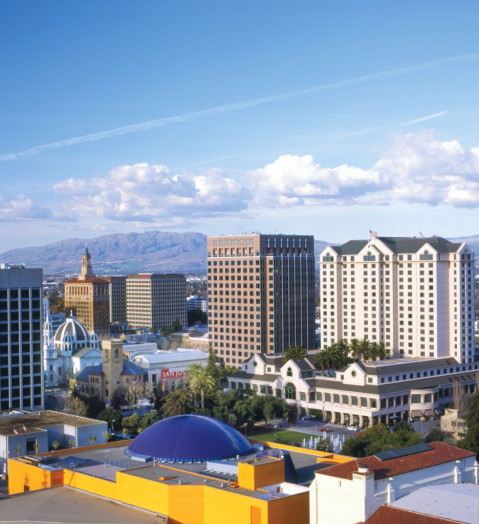Widgetized Section
Go to Admin » Appearance » Widgets » and move Gabfire Widget: Social into that MastheadOverlay zone
Forecast for Sunshine: Open Government in the City of San José
Tom Norris
On March 2, 2010, the San José City Council approved two
groundbreaking measures intended to bring greater transparency and
accountability—“sunshine”—to the workings of City government. The
decisions were the natural next steps built on a multi-year program of
increased transparency.
The latest decisions grew out of a Public Records request
in early 2009 as rumors were circulating that City Councilmembers were
communicating via text messages and emails with lobbyists and other
interested parties advocating positions and actions on issues under
debate during City Council and Council Committee meetings. In an attempt
to determine the accuracy of the rumors, a San José Mercury News
reporter invoked the California Public Records Act (CPRA) and asked for all written and/or electronic communications, including
memoranda, emails, text messages and voice mails, sent or received by
elected city officials during any city council meeting or city council
committee meeting since December, 2008.
The City responded by disclosing nearly 400 email and text
messages. Later, the reporter asked why the only text messages provided
were those transmitted through the City’s email system. City staff
replied that communications sent or received on personal communication
devices not owned by the City and not captured by the City’s system are
not subject to the CPRA.
Later in the year, the Mayor and City Council directed
City staff to explore and report back on ethics and public records
issues related to the use of personally owned communications devices to
conduct City business. That led to two changes designed to increase
transparency. The first requires members of the City Council to disclose
text messages and emails received during a public meeting from
lobbyists and other individuals having an interest in an item being
discussed. The other designates all messages regarding City business
received on personally owned devices subject to public records access
requirements.
One reporter noted that it was likely that San José was
the first city in the nation to enact such measures, and the City
Council action garnered national attention.
The approval of these measures marked only the latest
result of three years of activity devoted to enhancing open government
in San José. These efforts came in the wake of numerous news media
accounts in 2005 alleging excessive secrecy and undue influence of
lobbyists on the part of some City of San José officials.
The intense media attention prompted then Councilmember
(now Mayor) Chuck Reed to propose 34 Reed Reforms promoting open
government in early January 2006. Two months later, the City Council
proposed adopting a number of similar reforms and directed the City
Manager to develop a work plan for implementation, including
recommendations on how to engage the public in the process via a “task
force, working group, or other” means.
On April 18, 2006, the San José City Council approved a
15-member “Sunshine Reform Task Force (SRTF)” to review and provide
recommendations regarding the various open government proposals put
forward by Councilmembers as well as to propose additional ones to
render City government more transparent and accountable. The Task Force
consisted of representatives from neighborhood associations, the media,
labor, business, academia, community based organizations, City boards
and commissions, and one at large member.
The Task Force members began their work in June 2006. Over
the next two years, the SRTF would meet another 44 times, not including
the dozens of meetings of various sub-committees. The Sunshine Reform
Task Force developed its recommendations in two Phases. It was an
extraordinary effort on the part of these volunteers, leading to a final
report in July of 2008.
Phase I addressed the rules for conducting public meetings
and closed sessions, and established new requirements for public
information and outreach activities. Phase II focused on the ethics and
conduct of public officials, employees, volunteers and various partners
of City government; as well as access to public records and information;
the use of technology to further open government; and the
administration and accountability of the City’s open government program.
Throughout the process, there was a continuous effort to
balance the need for increased transparency against the personal privacy
rights of individuals. In addition, there was significant concern
within the City organization over the additional time and resources that
would be required to meet the new requirements.
Nevertheless, of the 113 separate recommendations made by
the Task Force, 108 were adopted by the City Council either as submitted
or with revisions. All of these recommendations were approved at five
separate City Council meetings with implementation of the approved
measures beginning shortly after adoption.
Today, San José city government is more transparent than
ever before. In addition to the two measures adopted on use of personal
communications devices, new Open Government actions include the
following:
- Public meetings must adhere
to guidelines far more stringent than the open meeting requirements
found in California State law—agenda and materials to be discussed at
public meetings are made available to the public via the City’s web site
far in advance of the actual meetings. - Information regarding
lobbyists is posted on-line, and Councilmembers and the members of
boards and commissions must disclose communications from lobbyists any
item under discussion. - New time frames for
responding to requests for public records help speed the disclosure of
records to requestors. - Members of the public who
are denied requested records now have access to an administrative
appeals process where before the only means of appeal was through a
lawsuit. - On-line calendars providing
information of appointments from the previous week must be updated each
Monday by the Mayor, Councilmembers, and certain other high level City
officials. - Members of the City
Council, boards and commissions, City employees, vendors, lobbyists,
volunteers, and other non-governmental partners must verify in writing
that they will abide by the City’s Code of Ethics. - New requirements to improve
accountability of not-for-profit organizations that receive City
funding are in place. - A searchable database of
Council votes is being developed. - Statistical reports on
activities will be issued by the Police Department, Fire Department, and
the Independent Police Auditor on a regular basis. - Changes and additions to
City records retention schedules must be posted on-line for 30 days
before going into effect.
Nowadays, “open government” is more than just a catch
phrase in the City of San José. It is how the public’s business is done.
Tom Norris is public records manager for the City of San José. Email: [email protected]






Follow Us!